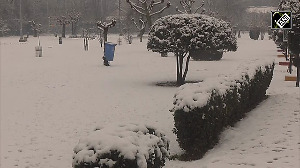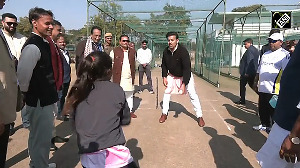Former Supreme Court Chief Justice A H Ahmadi rejected criticism of dilution of charge against Union Carbide executives in Bhopal gas tragedy case, saying in criminal law there was no concept of vicarious liability. He also lamented that there was absence of law to deal with disasters of this kind and said the law can be amended to provide for adequate punishment.
Justice Ahmadi, who headed the bench in 1996 that converted the CBI charge under the stringent provisions of 304-II that provided for maximum of 10 years imprisonment to Section with two years maximum imprisonment, said it was easy for people to talk and make allegations but judges have to work under the system. "One has to work within the system, within the framework of law. It is easy to speak today, to swing with the tide," he said reacting to criticism that the decision given by bench had led to light punishment given by a Bhopal court in the gas case on Monday.
"There is no concept of vicarious liability. If my driver is driving and meets with a fatal accident, I don't become liable to be prosecuted under 304-II," he said. Justice Ahmadi said that there was no vicarious liability concept in criminal law except that "if there is an abetment, the abettor may be joined with the principal offender. If there is a common intention situation or conspiracy situation, that is understandable. Otherwise no."
Justice Ahmadi said he was not not claiming he was always right. "We can go wrong but there are remedies." "If I had made mistake then there was ample time for people to get it reviewed. CBI could have got it reviewed and the NGOs could have got it. Why not? It only goes to show that the decision was correct. "If there is no charge under 304 A and was only under 304-II, if that charge was not accepted as proved, even under 304
He said that the magistrate had awarded the maximum sentence. "The remedy is either to go for enhancement of sentence. But in this case, the magistrate has given the maximum, he could. So, there is no question of enhancement. Compensation could have been granted. But I don't think the view which I took was wrong," Justice Ahmadi said. He denied the allegations that he allowed the UCIL tosell the shares. "That day, I heard that Sarangi (Bhopal rights activist) said that I allowed UCIL to sell the shares. The shares were already sold. It was the money which was lying there and I diverted the money for the purposes of construction of hospitals which were lying in a limbo for six or eight years. So today, that benefit has gone to the gas victims."
Justice Ahmadi said that the principal offender, Warren Anderson, should have been prevented from leaving the country. "It was unfortunate that Anderson was allowed to go in the first place because he was the principal offender and if the principal offender is allowed to go scot-free, the subsidiary offender might say that well if he can go scot-free, why do you want to punish us," he said. "Who allowed him to walk away," he shot back adding absence of extradition treaty could have made the job difficult. But, he said, why blame the judiciary for that. Asked whether the Bhopal court verdict should be challenged, Justice Ahmadi said it was for agencies to decide.






 © 2025 Rediff.com -
© 2025 Rediff.com -